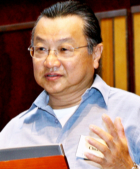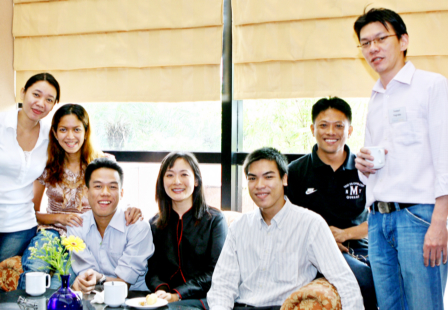“Year of Transition” for TREAT Asia
Pediatrics Group Joins Network Meeting for First Time

Dr. John Chua addressed the importance of updating computerized databases to facilitate the research undertaken by TREAT Asia participants. (Photo: Luong Hung)
|
March 2008— With a record number of scientific papers published during 2007 and a growing list of major projects under way, TREAT Asia is entering a new phase of growth and influence, agreed participants at the 2007 Network Meeting, held 7-10 September in Hanoi.
Welcoming more than 180 HIV/AIDS specialists from Asia and around the world—including more than 60 pediatric doctors, nurses, and researchers from the TREAT Asia pediatrics program, who joined the Network Meeting for the first time—TREAT Asia director Kevin Frost laid out the challenge.
"This is a year of transition," Frost said, "a year when TREAT Asia can move into a position of regional leadership in the fight against AIDS and the network's long-term commitment to this work can help tip the balance in Asia."
TREAT Asia steering committee member Dr. Annette Sohn emphasized the Network's collective strength. "TREAT Asia is potentially very powerful because we have all these incredible clinicians in this room," she said, summing up the growing confidence of participants in the effectiveness of the organization they have built over the last seven years.
The growth of the TREAT Asia Network and the broad range of projects undertaken by its members led to a greater number of specialized sessions at this year's meeting, covering such topics as HIV-related cancers, database training, new research proposals, budgeting and grant reporting, and strategies for community training programs. Highlights of the meeting included:
TREAT Asia HIV Observational Database (TAHOD)—Over the course of 2007,TAHOD researchers published seven research papers in such prestigious scientific journals as The Journal of Acquired Immune Deficiency Syndrome, HIV Medicine, and International Journal of STD and AIDS. At a workshop held the day before the Network Meeting began, TAHOD researchers discussed current projects, including work on TB diagnosis and progression as well as analyses of treatment outcomes in low and high-income countries. Participants received specialized training on AIDS-defining cancers as they prepare to undertake retrospective and prospective studies of cancer diagnoses among TAHOD patients.
TREAT Asia Pediatric Program—The addition of pediatric HIV specialists at this year's Network Meeting brought a renewed focus on treatment issues, but clinical research is one of the primary goals of the pediatric program. According to Dr. Virat Sirisanthana of Chiang Mai University, the pediatric program has made significant progress in setting up the TREAT Asia Pediatric HIV Observational Database (TApHOD), developing a research protocol and creating a database for those sites that didn't have one. TApHOD has been launched with data transmission by four sites, and additional sites are expected to add their data over the coming months.
But involvement in clinical research is not universal among TREAT Asia's pediatric sites, noted Dr. Annette Sohn.The heart of TREAT Asia's pediatric program, she said, lies in the way participating specialists work together as a network, sharing information about treatment strategies, advocacy, and community programs. The need for treatment is particularly great among Asia's children, according to Dr. Sohn, who cited data showing that antiretroviral treatment reaches only about 20 percent of children who need it, compared with around 50 percent of Asian adults.
Community Programs—During 2007, TREAT Asia supported a variety of community education and training programs across the region, notably in Cambodia, China,Thailand, and Viet Nam. In addition to establishing Red Ribbon Centers through local partnerships in China, which provide highly effective treatment support and education for people affected by HIV/AIDS,TREAT Asia implemented a treatment literacy training program for women in Cambodia, helped create treatment literature with the Thai AIDS Treatment Action Group, and initiated training for peer treatment educators in 10 Vietnamese provinces.

During a break at the TREAT Asia meeting in Hanoi, Dr. Annette Sohn (center) gathered with ACATA members Ayi Farida, Jeanne D'Arc Truong, Addy Chen, Duong Truong Thuy, Dhayan Dirgantara, and Sam Nugraha. (Photo: Luong Hung)
|
One of TREAT Asia's most significant community programs in recent years is the Asian Community for AIDS Treatment and Advocacy (ACATA), a training and support initiative for a group of young Asian HIV/AIDS advocates and educators. For many ACATA members, the Hanoi meeting marked the completion of the three-year program and provided a chance to reflect on the effectiveness of community-based efforts to improve prevention and treatment. Participants underlined their conviction that the fight against HIV/AIDS in Asia cannot be won without broad-based, concerted action. "We must all work together," said ACATA member Ayi Farida, a treatment advocate located in the Indonesian province of Papua—"researchers, community, doctors, and pharmaceutical companies." ACATA is supported by GlaxoSmithKline's Positive Action programme.
TREAT Asia Studies to Evaluate Resistance (TASER)—TREAT Asia's new HIV drug resistance surveillance and monitoring program, TASER, was initiated almost two years ago. TREAT Asia Research Director Jeffery Smith explained that the study's lead-in time has been somewhat longer than expected because of the rigorous and complex requirements of the program, including locating and scaling-up adequate genotyping labs, enrolling an appropriate number of patients, and resolving details of the study's implementation. TREAT Asia clinical centers began enrolling participants into the TASER studies in mid-2007.
In order to standardize the performance of the genotyping labs involved with TASER and to monitor the accuracy and consistency of their results, TREAT Asia established the TREAT Asia Quality Assurance Scheme (TAQAS) in April 2006. Seventeen laboratories from 10 countries participated in the October 2007 round of TAQAS proficiency testing.
Looking Ahead
Along with updates on these and other TREAT Asia projects, reports were delivered from TREAT Asia's scientific and steering committees. Additional presentations were delivered by Dr. Gerald Sharp on the progress of the International Epidemiologic Databases to Evaluate AIDS (IeDEA); Dr. David Cooper, who provided a special dinner presentation on his life in HIV/AIDS research; and Dr. John Chuah, who spoke about his experience in Australia with computerized databases. But on the last day of the meeting, discussions within the full Network focused on the future of TREAT Asia and on how the group might expand its role, specifically in regard to Asia-wide leadership, mentoring, education, and policy-related activities.
The Hanoi Network Meeting brought together participants from 21 countries representing TREAT Asia sites, nongovernmental organizations, and industry. Among those in attendance were representatives of Abbott Molecular, the Clinton Foundation, Family Health International, GlaxoSmithKline, the PharmAcccess Foundation, Médecins du Monde, Médecins Sans Frontières, UNICEF, the World Health Organization, the Worldwide Orphans Foundation, the US Centers for Disease Control and Prevention, and the US National Institutes of Health.